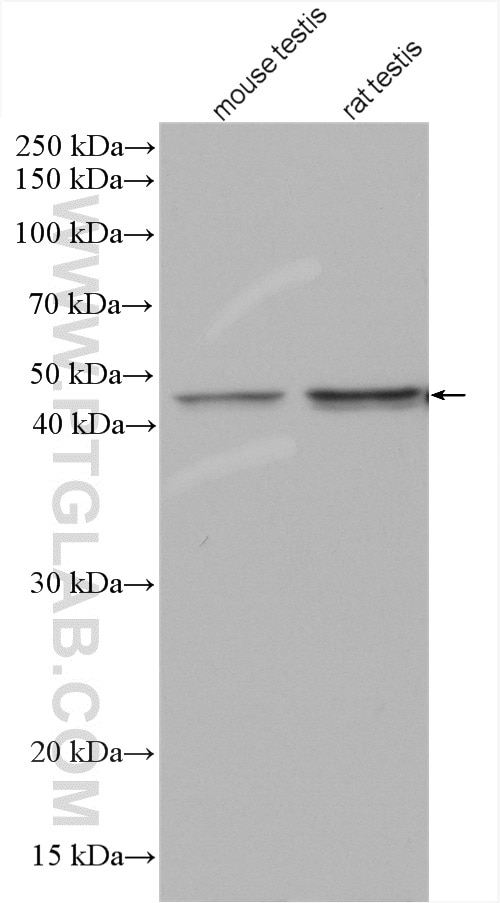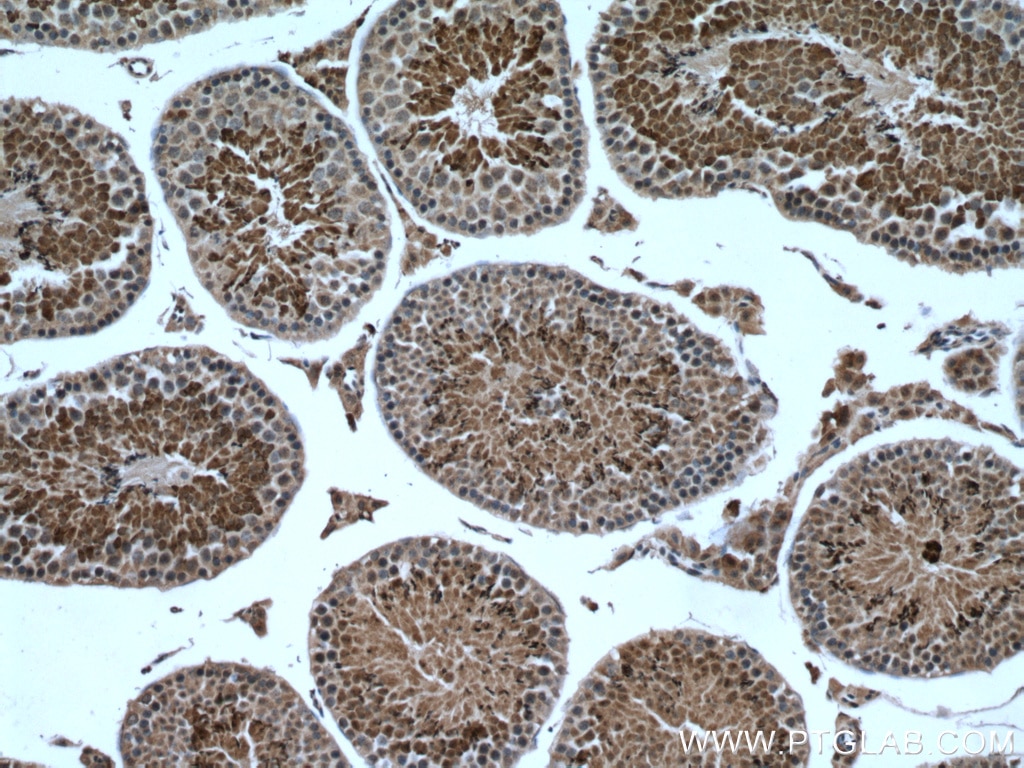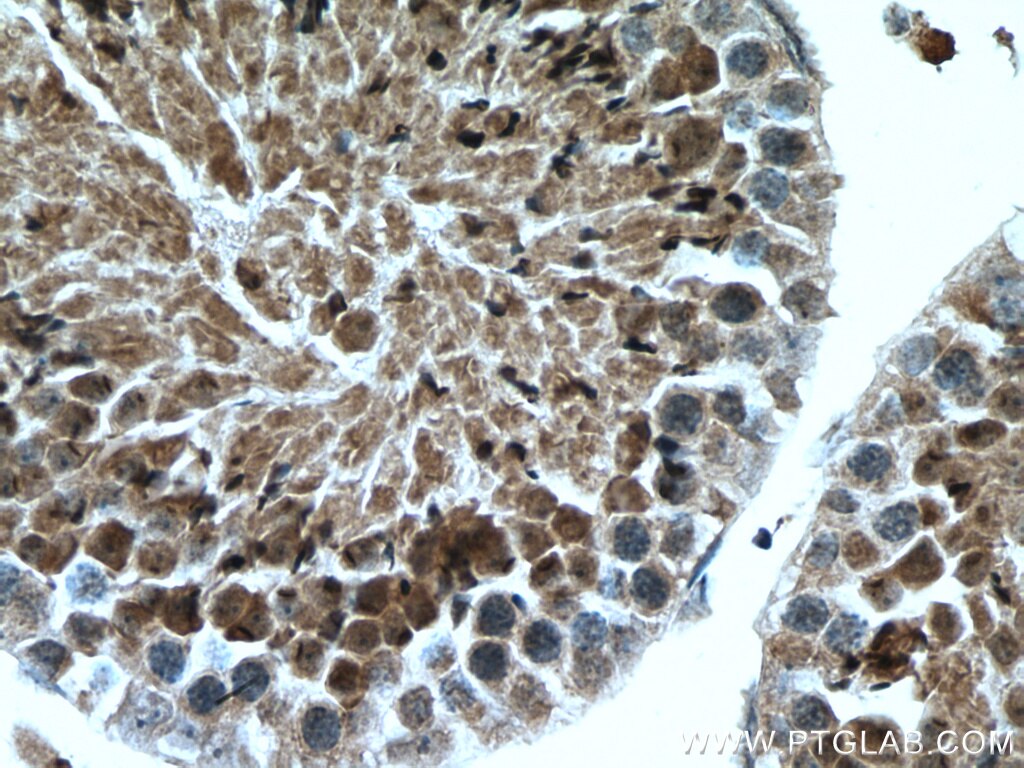Anticorps Polyclonal de lapin anti-ACTL7A
ACTL7A Polyclonal Antibody for WB, IHC, ELISA
Hôte / Isotype
Lapin / IgG
Réactivité testée
Humain, rat, souris
Applications
WB, IHC, IF, IP, CoIP, ELISA
Conjugaison
Non conjugué
N° de cat : 17355-1-AP
Synonymes
Galerie de données de validation
Applications testées
| Résultats positifs en WB | tissu testiculaire de souris, tissu testiculaire de rat |
| Résultats positifs en IHC | tissu testiculaire de souris, il est suggéré de démasquer l'antigène avec un tampon de TE buffer pH 9.0; (*) À défaut, 'le démasquage de l'antigène peut être 'effectué avec un tampon citrate pH 6,0. |
Dilution recommandée
| Application | Dilution |
|---|---|
| Western Blot (WB) | WB : 1:1000-1:5000 |
| Immunohistochimie (IHC) | IHC : 1:50-1:500 |
| It is recommended that this reagent should be titrated in each testing system to obtain optimal results. | |
| Sample-dependent, check data in validation data gallery | |
Applications publiées
| WB | See 8 publications below |
| IHC | See 1 publications below |
| IF | See 11 publications below |
| IP | See 2 publications below |
| CoIP | See 3 publications below |
Informations sur le produit
17355-1-AP cible ACTL7A dans les applications de WB, IHC, IF, IP, CoIP, ELISA et montre une réactivité avec des échantillons Humain, rat, souris
| Réactivité | Humain, rat, souris |
| Réactivité citée | Humain, souris |
| Hôte / Isotype | Lapin / IgG |
| Clonalité | Polyclonal |
| Type | Anticorps |
| Immunogène | ACTL7A Protéine recombinante Ag10613 |
| Nom complet | actin-like 7A |
| Masse moléculaire calculée | 435 aa, 49 kDa |
| Poids moléculaire observé | 49 kDa |
| Numéro d’acquisition GenBank | BC014610 |
| Symbole du gène | ACTL7A |
| Identification du gène (NCBI) | 10881 |
| Conjugaison | Non conjugué |
| Forme | Liquide |
| Méthode de purification | Purification par affinité contre l'antigène |
| Tampon de stockage | PBS with 0.02% sodium azide and 50% glycerol |
| Conditions de stockage | Stocker à -20°C. Stable pendant un an après l'expédition. L'aliquotage n'est pas nécessaire pour le stockage à -20oC Les 20ul contiennent 0,1% de BSA. |
Informations générales
ACTL7a is located in the acrosome and tail of mature spermatozoa and plays an important role in spermiogenesis. Recently mutation of ACTL7A has been linked to infertility.
Protocole
| Product Specific Protocols | |
|---|---|
| WB protocol for ACTL7A antibody 17355-1-AP | Download protocol |
| IHC protocol for ACTL7A antibody 17355-1-AP | Download protocol |
| Standard Protocols | |
|---|---|
| Click here to view our Standard Protocols |
Publications
| Species | Application | Title |
|---|---|---|
Am J Hum Genet Homozygous pathogenic variants in ACTL9 cause fertilization failure and male infertility in humans and mice. | ||
Hum Reprod ACROSIN deficiency causes total fertilization failure in humans by preventing the sperm from penetrating the zona pellucida | ||
Hum Reprod Deletion of ACTRT1 is associated with male infertility as sperm acrosomal ultrastructural defects and fertilization failure in human | ||
Hum Reprod Loss of SPACA1 function causes autosomal recessive globozoospermia by damaging the acrosome-acroplaxome complex. | ||
Hum Reprod Novel bi-allelic variants in ACTL7A are associated with male infertility and total fertilization failure. | ||
Development Loss of perinuclear theca ACTRT1 causes acrosome detachment and severe male subfertility in mice. |




